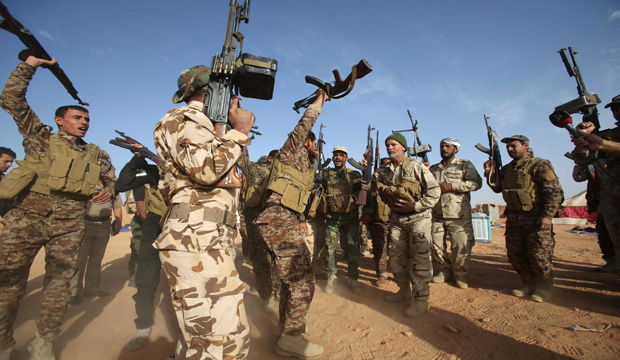
Iraqi fighters from the Shi’ite Muslim Al-Abbas popular mobilization unit hold up their weapons in the area surrounding the village of Nukhayb in the embattled Anbar province west of the capital Baghdad, on May 19, 2015. (AFP/Mohammed Sawaf)
Baghdad, Reuters—Iraqi security forces on Tuesday deployed tanks and artillery around Ramadi to confront Islamic State of Iraq and Syria (ISIS) fighters who have captured the city in a major defeat for the Baghdad government and its Western backers.
After Ramadi fell on Sunday, Shi’ite militiamen allied to the Iraqi army had advanced to a nearby base in preparation for a counterattack on the city, which lies in Anbar province just 70 miles (110 kilometers) northwest of Baghdad.
As pressure mounted for action to retake the city, a local government official urged Ramadi residents to join the police and the army for what the Shi’ite militiamen said would be the “Battle of Anbar.”
Sunni ISIS fighters had set up defensive positions and laid landmines, witnesses said. As the group tightened its grip on the city, Islamists went from house to house in search of members of the police and armed forces and said they would set up courts based on Islamic Sharia law.
They released about 100 prisoners from the counter-terrorism detention center in the city.
Saed Hammad Al-Dulaimi, 37, a school teacher who is still in the city, said: “ISIS used loudspeakers urging people who have relatives in prison to gather at the main mosque in the city center to pick them up. I saw men rushing to the mosque to receive their prisoners.”
The move could prove popular with residents who have complained that people are often subject to arbitrary detention.
Sami Abed Saheb, 37, a Ramadi restaurant owner, said ISIS found 30 women and 71 men in the detention center. They had been shot in the feet to prevent them escaping when their captors fled.
Witnesses said the black flag of ISIS was now flying over the main mosque, government offices and other prominent buildings in Ramadi.
Jasim Mohammed, 49, who owns a women’s clothing shop, said an ISIS member had told him he must now sell only traditional Islamic garments.
“I had to remove the mannequins and replace them with other means of displaying the clothes. He told me that I shouldn’t sell underwear because it’s forbidden,” he said.
ISIS had also promised that food, medicine and doctors would soon be available.
Dulaimi said ISIS fighters were using cranes to lift blast walls from the streets and bulldozers to shovel away sand barriers built by security forces before they fled.
“I think they [ISIS] are trying to win the sympathy of people in Ramadi and give them moments of peace and freedom,” he said.
The decision by Prime Minister Haider Al-Abadi, who is a Shi’ite, to send in the militia, known as Hashid Shaabi or Popular Mobilization, to try to retake the predominantly Sunni city could add to sectarian hostility in one of the most violent parts of Iraq.
The Abadi government had pledged to equip and train pro-government Sunni tribes with a view to replicating the model applied during the “surge” campaign of 2006–2007, when US Marines turned the tide against Al-Qaeda fighters—forerunners of ISIS—by arming and paying local tribes in a movement known as the Anbar Awakening.
But a repeat will be more difficult. Sunni tribal leaders complain that the government was not serious about arming them again, and say they received only token support.
There are fears that weapons provided to Sunni tribes could end up with ISIS. The extremist group has also worked to prevent a new Awakening movement by killing sheikhs and weakening the tribes.
Iraqi ministers on Tuesday stressed the need to arm and train police and tribal fighters. Abadi called for national unity in the battle to defend Iraq.
A spokesman for Iraqi military operations, Saad Maan, said the armed forces controlled areas between Ramadi and the Habbaniya military base about 20 miles (30 kilometers) away where the militia fighters are waiting.
“Security forces are reinforcing their positions and setting three defensive lines around Ramadi to repel any attempts by terrorists to launch further attacks,” Maan said.
“All these three defensive lines will become offensive launch-pads once we determine the zero hour to liberate Ramadi.”
The International Organization for Migration said 40,000 people had been forced to flee Ramadi in the past four days.
About 500 people were killed in the fighting for Ramadi in recent days, local officials said.
ISIS gains in Ramadi mean it will take longer for Iraqi forces to move against them in Mosul, where militants celebrated victory in Anbar by firing shots into the air, sounding car horns and playing Islamic anthems, residents said.
